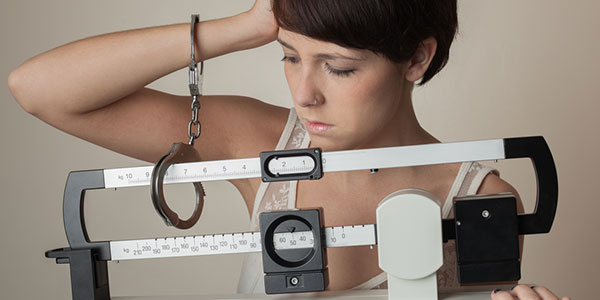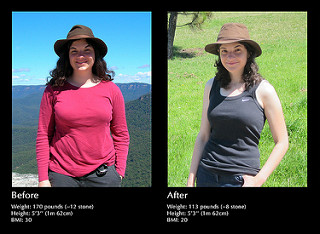4 Signs that You Are Too Obsessed with Your Weight
4 Signs that You Are Too Obsessed with Your Weight
While the desire to get to a healthy weight and improve your health is certainly admirable, here are four signs that you might be taking it a bit too far.

Food and weight obsessions can be damaging. Not only do they provoke harmful food choices or the lack thereof, negative thoughts and attitudes can arise. Body dissatisfaction can in turn lead to low self-esteem and self-doubt. Desiring health is respectable and taking the measures to do so is admirable. Weight loss stress may arise during the journey and getting to the end result might be filled with pressure. We only get one body so we might as well take care of it, right? So, how does one know if they have an unhealthy obsession with weight or if they are just making healthy choices for their body? There are signs and signals to look for to distinguish between simple, healthy steps during the journey or if you are too concerned with weight.
4 Signs that You Are Too Obsessed with Your Weight
1. Detailed Calorie Counting
Watching and being mindful of calories is important for weight loss. However, precise measuring and counting of foods and calories might be slightly obsessive. Taking it a step further, if you count calories from toothpastes and other non-food items, you might be too concerned with weight and calories. Not eating enough and avoiding hunger cues is risky. If you feel lightheaded, fatigued, or have reoccurring headaches, you might not be getting enough to eat. Health may be compromised in turn and serious medical complications may develop.
2. Overdoing Exercise
Like calories, exercise is also an essential component to weight loss. Although physical activity is recommended five times a week for 30 minutes, obsessing over exercise can be dangerous. Overdoing exercise and not allowing time for the body to heal increases the risk of pulling muscles and damage. If gym time takes away from relationships, responsibilities, and events, you might be too concerned with weight and fear weight gain.
3. Constant Weighing
Cannot get enough of the scale? Although weight checking can be a motivator, using it as a health-dictator is not ideal. The number on the scale can facilitate a cascade of negative thoughts following weight fluctuations. High fluid intake has the ability to increase weight by about five pounds. Most people do not realize the increase is water weight, not body weight, and become discouraged. If partaking in weight training, muscle mass might be increasing as well. Instead of focusing on pounds, try contributing success on how you feel.
4. Mirror Checking
If you find yourself standing in front of the mirror and criticizing your body often, you might have an unhealthy obsession with weight. Checking out and honing in on self-disapproved parts of the body can make matters much worse. Realistically, anxiety is getting fed if looking in the mirror for long periods of time rather than brief checks, telling yourself you are fat while in front of the mirror, and focusing on parts you hate the most.
It's All About the Journey
Although meeting a final weight loss goal is tremendous success, health is a lifelong journey. Instead of regretting that slice of cake consumed at a weekend birthday party, shake it off and move forward. Since food should be appreciated and enjoyed, allow it to be. A healthy relationship with food is just as important as actually consuming nutritious foods. Experiencing life with a healthy lifestyle not only reduces the risk of chronic diseases, but increases a sense of fulfillment and enjoyment.
If you notice yourself or someone close to you is experiencing and expressing those obsessive signs, reach out for help. Disordered eating and body dissatisfaction can create serious mental and medical complications. Registered dietitians, psychologists, and physicians can all play a role in a more satisfying and rewarding health journey.
-
Not All Calories Are Created Equal!
When will these so-called experts in our field figure this out? If I h
-
The Ten Best Diet Foods In Existence
What you eat and what you eat will have a big effect on how quickl
-
Using Resistance Band Exercises for the Stomach
Searching for resistance band exercises?
-
Proper Ways of How to Lose Fat
How to lose Fat is the age-old question. Many people want to lose
-
How Do Weight Loss Pills Work?
Weight loss pills have always been an easy and convenient option for
-
Celebritys Like Rachel Ray Feature Acai Berry
We all know Rachel Ray swears by Acai. Acai is a berry promoted by Opr
- DON'T MISS
- ***Diet You Can't Cheat On!
- Lose Extra Pounds With The Strongest Fat Burners To Get A Sleek Body
- Tips On How To Burn Fat
- Whats Liposuction About?
- Yogurt And Honey For Fast Weight Loss
- Best Weight Loss Tips - Fat Loss Workouts For Better Results
- Are You A Suitable Candidate For Bariatric Surgery
- Light Lunches Youll Love
- Big Buts Sabotage Weight Loss Health And Fitness Part 3 Of 12
- Law Of Attraction Resolves Diet Controversy




